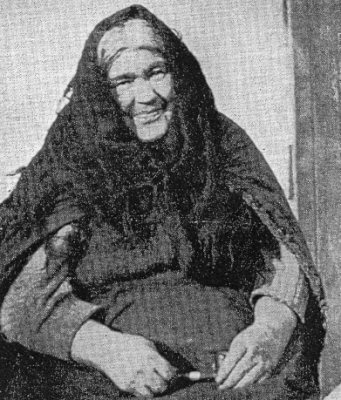‘She was a through-other oul’ bit an’ none too sonsy at that, for it wus often said she wus given till ridin’ a broomstick.
But all the same she wus come of oul’ residenters an’ when she wus past fendin’ for herself the neighbours wur good till her, and sent the wee ones with milk and male many a time.
But they wur always afeared till go in for they’d heared many a crack they shouldn’t. An’ when they thumped the dure their hearts wud be in their mouths till she slithered out. For there wus always the chance that she might not appear as herself, at all, at all!
An’ she wus the last one till see the wee people here. Before they left the country they went till the house till her. An’ what do you think for? Why, they went till tell her they wur goin’ till war. An’ she an’ them being sich frien’s, they bid till tell her.
‘An”, says the spokesman, ‘we may niver be back!’
An’ she ups and says, ‘Och, but ye will now. Shure it’s die I wud without ye’s.’ An’ with that she started till yammer. Says she, ‘I cud niver thole the whole winter through, without news of ye’s.’
Says he, ‘We’ll lave ye a sign, then.’
‘An’ what will it be?’ says she.
‘Keep yer blinkers on the well,’ says he. ‘If we’re bayte, it’s bludy the water ‘ill be.’
An’ bludy water it wus, an’ she tuk a brash an’ died of heart lonliness for them, and that wus the en’ of her.
An’ mind ye all, all be it she was but a wee croul of a woman, she wusn’t a bit afeared of man or brute, even in the bad times, when it wus far from safe a man wus for to be alone, let alone a woman.
An, them that toul’ me the story of her knowed well all about her an’ her fairy frien’s.’
